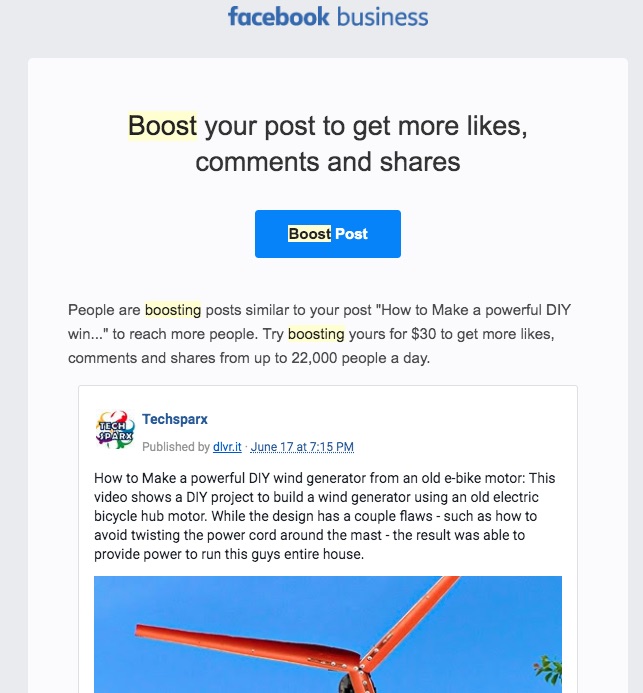; Date: Mon Jul 01 2019
Tags: Independent Web »»»» Google »»»» Facebook »»»» Search ranking »»»» Search Engine Optimization »»»»
The web has long been a place where anyone can launch a website, and thereby have their own soapbox from which to speak the message singing from their heart. But it has become harder and harder over the years for the small scale website to continue reaching an audience. The major gatekeepers on spreading our message have become Facebook, Google, and similar sites, and those gatekeepers are increasingly favoring major outlets owned by the major media conglomerates.
I have published a number of websites on my own dime, and on my own time. Most of these websites have been useful to people, and have drawn a fair amount of traffic. But traffic has declined over the years -- well, it's increasingly clear that moves by Google, Facebook, and that ilk, are being made to favor the major media websites over small-fry websites like mine.
Facebook now requires paying for advertising to have visibility
For example - it is easy to set up a Facebook page corresponding to a website. Traditionally Facebook pages have been used to promote websites. For example one could easily configure a system whereby item published to an RSS feed is automatically to the Facebook page, and anybody who had Like'd the page would automatically be notified of the new content.
It is still easy to set that up, though the mechanism has changed. But, Facebook has been downplaying the role of Pages for quite awhile. Posts on pages rarely show up as organic results in a person's Facebook news feed. Therefore the Page could show all the content it wants, but the audience typically won't see it by default. At the same time Facebook has increasingly pushed Page owners into buying advertising to boost the visibility of a posting on a Page.
Frequently I am notified by e-mail that: "Your post could be reaching more people" The e-mail includes this plea:

It used to be the default that posts to Facebook pages would be visible. Now a Facebook page owner has to pay for the traffic.
Where did the claim Google and Facebook control 70 percent of the web come from?
I read it in an email from Shareable which recounted their woes as an independent pseudo-journalism enterprise. Namely:
Over the last few years, Google and Facebook, who now control over 70% of all web traffic, made changes that have significantly reduced the reach of countless websites ...
In Facebook’s case, they simply blocked access to around 90% of all page owner’s fans -- except if you pay for access. Google has made many changes including ones that favor mainstream news sites. As a result, scores of independent news sites like Shareable have been hurt. Alternet, also an independent news nonprofit, sees these changes as a form of censorship.
A possible source for that figure is:
THE WEB BEGAN DYING IN 2014, HERE'S HOW
Written in 2017 what's presented is just as true today as then. An issue is that most people are on the Internet via apps on their mobile phone. Instead of sitting in a web browser on the mobile phone, they're on Facebook etc. Generally speaking both Facebook and Google (and to an extent Twitter) are filtering what we do or do not see on the Internet.
Facebook is a growing source of referral traffic to websites. What this means is increasingly the source of traffic is whether someone see's it in their Facebook interactions. Search engine traffic, primarily Google, is decreasing in importance where in the past this was the overwhelming majority source.
In 2014 Facebook refocused itself on its social networking properties.
In 2014 Google announced a restructuring into Alphabet, a downplaying of social network properties (Google has since shut down Google+), and a huge embrace of machine learning and artificial intelligence.
Where Facebook and Google used to compete, they're now swimming in orthogonal oceans. That has decreased diversity.
Facebook ignores reports of fake advertising
Apparently because Facebook needs revenue, it is ignoring reports of fake advertising, or advertising containing false or malicious claims:
Facebook downplaying certain types of content
- Facebook demotes news from liberal website on conservative site's say-so
- Facebook usage may fuel anti-refugee violence in Germany
- Facebook moves towards paying content creators sharing "art" in the news feed
Google is downplaying organic results in Google Search, and playing up their own properties and services
I've been using DuckDuckGo for so long that I haven't kept up with changes in how Google presents search results. Google search results used to be all about the organic results from the search query, along with a little bit of advertising. But in recent years Google has snuck more and more of its own properties and services into the search results, and the organic results are being buried. Further, in training material presented to folks wishing to use Google Adsense, we're told that organic search results are increasingly irrelevant.
YouTube squishing small-time YouTube creators, promoting big media outlets
- Is everyone really leaving YouTube? Or is it just a few whiners who are leaving?
- Example YouTube advertising revenue decline -- but YouTube huckster ignores adpocalypse
- Scotty at Strange Parts opens the door into how YouTube Creators build their business
- New YouTube Adpocalypse, where YouTube videos demonetized by offensive comments
- The YouTube Adpocalypse enraged a YouTuber to randomly shooting people at YouTube HQ
- YouTube video recommendation algorithm reportedly preferences conspiracy videos
- Google possibly dooms YouTube by explicitly cancelling monetization for channels with low viewership
- Google search ranking and YouTube monetization changes - demoting fake news while harming legitimate sources
- A look into the YouTube Adpocalypse - Video Blogger shows how his revenue has dried up
- As Google commercializes YouTube, individual "creators" may be squeezed out
Google makes it hard to notify Google about ads that lead to questionable sites, or contain questionable false or malicious claims
- {}(/blog/2019/03/google-bad-ad.html)











